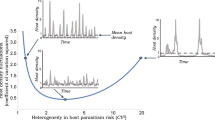Abstract
This study examines the influence of various host-feeding patterns on host-parasitoid population dynamics. The following types of host-feeding patterns are considered: concurrent and non-destructive, non-concurrent and non-destructive, and non-concurrent and destructive. The host-parasitoid population dynamics is described by the Lotka-Volterra continuous-time model. This study shows that when parasitoids behave optimally, i.e. they maximize their fitness measured by the instantaneous per capita growth rate, the non-destructive type of host feeding stabilizes host-parasitoid dynamics. Other types of host feeding, i.e. destructive, concurrent, or non-concurrent, do not qualitatively change the neutral stability of the Lotka-Volterra model. Moreover, it is shown that the pattern of host feeding which maximizes parasitoid fitness is either non-concurrent and destructive, or concurrent and non-destructive host feeding, depending on the host abundance and parameters of the model. The effects of the adaptive choice of host-feeding patterns on host-parasitoid population dynamics are discussed.
Similar content being viewed by others
References
Abrams, P. A. 1983. Foraging time optimization and interactions in food webs.Amer. Naturalist 124, 80–96.
Aubin, J.-P. 1991.Viability Theory, Boston: Birkhäuser.
Aubin, J. P. and A. Cellina. 1984.Differential Inclusions Grundlehren der mathematischen Wissenschaften 264. Berlin: Springer-Verlag.
Briggs, C. J., R. M. Nisbet, W. W. Murdoch, T. R. Collier and J. A. J. Metz. 1995. Dynamical effects of host-feeding in parasitoids.J. Animal Ecol. 64, 403–416.
Busenberg, S. and P. van den Driessche. 1993. A method for proving the non-existence of limit cycles.J. Math. Anal. Appl. 172, 463–479.
Collier, T. R., W. W. Murdoch and R. M. Nisbet. 1994. Egg load and the decision to host-feed in the parasitoid,Aphytis melinus.J. Animal Ecol. 63, 299–306.
Deimling, K. 1992.Differential Inclusions on Closed Sets, Basel: De Gruyter.
Filippov, A. F. 1988.Differential Equations with Discontinuous Righthand Sides. Dordrecht: Kluwer Academic.
Flanders, S. E. 1953. Predatism by the adult hymenopterous parasite and its role in biological control.J. Econ. Ent. 46, 541–544.
Hartman, P. 1964.Ordinary Differential Equations. New York, Wiley.
Heimpel, G. E. and J. A. Rosenheim. 1995. Dynamic host feeding by the parasitoidAphitis melinus: the balance between current and future reproduction.J. Animal Ecol. 64, 153–167.
Hofbauer, J. and K. Sigmund. 1984.The Theory of Evolution and Dynamical Systems. Cambridge: Cambridge University Press.
Houston, A. I., J. M. McNamara and H. C. J. Godfray. 1992. The effect of variability on host feeding and reproductive success in parasitoids.Bull. Math. Biol. 54, 465–476.
Jervis, M. A. and N. A. C. Kidd. 1986. Host-feeding strategies in Hymenopteran parasitoids.Biol. Rev. 61, 395–434.
Jervis, M. A. and N. A. C. Kidd. 1995. Incorporating physiological realism into models of parasitoid feeding behaviour.Trends in Ecol. Evol. 10, 434–436.
Kidd, N. A. C. and M. A. Jervis. 1989. The effects of host-feeding behaviour on the dynamics of parasitoid-host interactions, and the implications for biological control.Res. Population Ecol. 31, 235–274.
Kidd, N. A. C. and M. A. Jervis. 1991a. Host-feeding and oviposition by parasitoids in relation to host stage: consequences for parasitoid-host population dynamics.Res. Population Ecol. 33, 87–99.
Kidd, N. A. C. and M. A. Jervis. 1991b. Host-feeding and oviposition strategies of parasitoids in relation to host stage.Res. Population Ecol. 33, 13–28.
Křivan, V. 1996. Optimal foraging and predator-prey dynamics.Theoretical Population Biol. 49, 265–290.
Křivan, V. 1996. Dynamic ideal free distribution: effects of optimal patch choice on predator-prey dynamics.Amer. Naturalist 149, 164–178.
Křivan, V. and E. Sirot. 1997. Searching for food or hosts: the influence of parasitoids behavior on parasitoid-host dynamics.Theoret. Population Biol. 51, to appear.
Murdoch, W. W. and A. Stewart-Oaten. 1989. Aggregation by parasitoids and predators: effects on equilibrium and stability.Amer. Naturalist 134, 288–310.
Murdoch, W. W., R. M. Nisbet, R. F. Luck, H. C. J. Godfray and W. S. C. Gurney. 1992. Size-selective sex-allocation and host feeding in a parasitoid-host model.J. Animal Ecol. 67, 553–541.
Rosenheim, J. A. and D. Rosen. 1992. Influence of egg load and host size on host-feeding behaviour of the parasitoidAphytis lingnanensis.Ecol. Entomol. 17, 263–272.
Sirot, E. and V. Křivan. 1997. Adaptive superparasitsm and host-parasitoid dynamics.Bull. Math. Biol. 59, 23–41.
Stearns, S. T. 1992.The Evolution of Life Histories. Oxford: Oxford University Press.
Stephens, D. W. and J. R. Krebs. 1986.Foraging Theory. Princeton, NJ, Princeton University Press.
Yamamura, N. and E. Yano. 1988. A simple model of host-parasitoid interaction with host-feeding.Res. Population Ecol. 30, 353–369.
Author information
Authors and Affiliations
Rights and permissions
About this article
Cite this article
Křivan, V. Dynamical consequences of optimal host feeding on host-parasitoid population dynamics. Bltn Mathcal Biology 59, 809–831 (1997). https://doi.org/10.1007/BF02459994
Received:
Accepted:
Issue Date:
DOI: https://doi.org/10.1007/BF02459994




